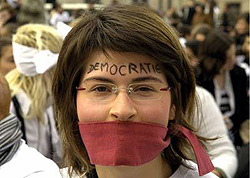John Milton, who was truly considered as the founder of the bureaucratic theory of free media, believed that a person must have the opportunity to hear what others say and say what he wants to say.
“Give me the freedom to know, express my own opinions and, most importantly, judge without a sense of remorse,” said Milton back in the 17th century. Even after 300 years, all we want is the freedom to hear and express ourselves, but as every dictatorship, the Soviet Union also placed “high” value on speech and did everything it could to make sure nobody said anything different. “Glasnost”, in other words freedom of speech, was the slogan which guided the Soviet Union during the perestroika period and eventually led up to or organized the collapse of the union. But that freedom of speech didn’t really mean freedom of speech even until the collapse. Perhaps we could consider that freedom of speech when people were no longer persecuted for saying something in a café, but it was not freedom of press. After all, freedom of press is the organized way of freedom of speech. If anyone asks me about freedom of press in Armenia, I can’t say that there is no freedom. Any citizen of Armenia has the right to gather information and open a newspaper edition, printing and publishing houses are private and are supposedly out of state control, there is no censure and, in contrast to other post-Soviet republics, Armenia doesn’t have a mass media governmental department. Based on all this, I can say that Armenia has freedom of press, but that is just from the outside. In reality, the press isn’t free and there are many and, at times, incomprehensible reasons for that. American expert Jeffrey Sax says the following about Russian press.
“They called us to the patient, but when we laid him down and cut him, we suddenly noticed that the patient had different body parts, which we hadn’t studied at the institute.”
Jeffrey Sax confesses that Western democracies are simply enforcing their cultural and institutional dogmas without asking themselves whether or not they correspond to our mentalities and traditions. For example, do they know that licensed Armenian television networks are still controlled by the state? The state doesn’t demand censuring plots and texts, but the financing by the oligarch serves as both an editor and censurer. Foreigners don’t know that whereas journalists were afraid of censure due to penalties during the Soviet Union, now they are simply afraid of losing their jobs.
The state is not doing anything to overcome this. When the “A1+” television network was prohibited from broadcasting its programs, some television networks that have an impact on the people turned pro-government. Armenian radio stations broadcast programs for the 15-25 age group. Newspapers don’t have enough readers to have an impact on the three branches of government by themselves or with help by their readers. The number of MP or some political party voters is higher than that of the copies of each Armenian newspaper; basically, each MP knows for a fact that he has more votes than there are people reading newspapers.
Armenian reality hasn’t gotten up to the point where freedom of speech plays a role in society, in other words, it hasn’t turned into a cornerstone for the modern market, democratic and political system of society. Freedom of speech is not higher than the freedom of property, competition, etc.
We used to dream of liberating ourselves from the communist ideology and looked towards the West. Western values seemed Etalon to us. More than 25 years ago, American journalist Walter Cronkite said:
“Freedom of speech is not important for democracy, but rather it’s democracy itself.”
Society gives journalists the right to speak on behalf of them and criticize the authorities because citizens can only criticize authorities during elections by voting for this or that MP and not voting for the other. This is how citizens give journalists the right to criticize authorities every day.
This is right in normal, stable countries. However, in Armenia, due to the low number of readers, journalists can’t fight against the authorities. Whereas families used to subscribe to receive five to six newspapers and two to three journals back in the Soviet Union, now people barely have enough to buy one or two newspapers. If the number of readers goes down, then “others” will come and take control.
Under these conditions, freedom of speech shrinks and it is looked at as society’s right to get information. After all, the printed newspaper sold at kiosks already says a lot about that right, but freedom of press is limited when the citizen doesn’t even have money to buy a newspaper.
The abovementioned, including the right to base mass media, lack of censure, etc. are used by the state to fend off Western forces. But whenever people start talking about the role that press plays in the country, they tie it to the government’s freedom and even get up to the point where they consider presenting their negative sides.
Unfortunately, Armenians don’t understand that a country can’t prosper without freedom of press and that it is much easier to control the freely expressed opinion rather than the opinion that isn’t expressed.

